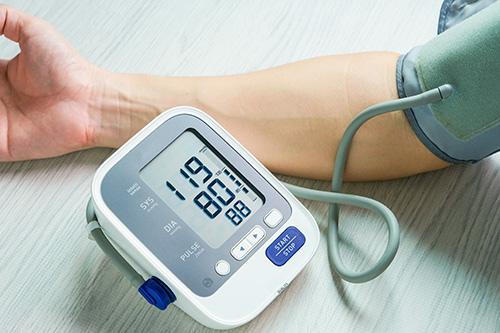Lipoprotein (a) Blood Test
Lipoprotein (a) - Lp(a) - is a type of fat found in your blood. Lp(a) levels are mainly determined by your genes and high levels significantly increase your risk of heart disease. Around 1-in-5 people have high Lp(a) levels.
Our Lipoprotein (a) Blood Test is a simple finger-prick test you can take at home and send to our lab for analysis. You'll receive a doctor's report with your Lp(a) level and an explanation of how it may affect your risk of heart disease and what to do about it.
Comes with our
- Results and doctor's report in 2 days or less
- Free, next-working day delivery
- Measures Lp(a) levels in nmol/L
Personalise your test
Lipoprotein (a) Blood Test base price:
£69.00Finger-prick blood collection
Total price:
£69.00
Don't just take our word for it
At Selph, we've helped thousands of people feel better today and live longer tomorrow.
Kay
“Great service gives you quick results very detailed and therefore piece of mind. Would definitely recommend to others.”
Five Star ReviewMartin Naylor
“Good service with speedy results and cheaper than the direct competitors I found. Peace of mind or the chance to act early.”
Five Star ReviewLisa
“Ordered a Stool Sample test for myself and a PSA test for my husband. We posted the tests back the day after we received them and got the results by email the following evening. Very good service and the results have put both our minds at rest.”
Five Star ReviewWhat you need to know about our Lipoprotein (a) Blood Test
Lipoprotein (a) or Lp(a) is a fat particle in the blood that causes narrowing of the arteries (atherosclerosis). Your levels of Lp(a) are determined by genes you inherit from your parents and about 1-in-5 of us have high Lp(a) levels. High levels of Lp(a) are the commenest genetic risk factor for heart disease and guidelines recommend that we all have our Lp(a) level tested at least once.
Taking an Lp(a) blood test gives you information about your heart disease risk and, if your Lp(a) level is high, you can take action to lower your risk.
How do high Lp(a) levels affect me?
You can think of Lp(a) as a kind of "supercharged" cholesterol particle. It's very good at getting into your blood vessel walls and causing atherosclerosis or narrowing. It's more damaging than other cholesterol-carrying particles such as LDL-cholesterol.
High Lp(a) levels increase your risk of:
- heart attack
- heart failure
- stroke
- aortic valve narrowing (aortic stenosis)
How do I know if I have high Lp(a) levels?
A high Lp(a) wont give you any symptoms. It's a little like having high cholesterol levels - you only really get symptoms when it's too late with narrowing of your arteries causing heart disease. The only way to know your Lp(a) is to take an Lp(a) blood test.
However, there are still a few clues that you might have a high Lp(a) level. You're at higher risk of having a hih Lp(a) level if:
- you have a family history of heart disease
- one or more of your relatives have high Lp(a)
- you're of black ethnicity
Who should take an Lp(a) test?
The short answer is that guidelines recommend that everyone check their Lp(a) level at least once. This is because high Lp(a) levels are common, affecting around 1-in-5 people. People with a family history of heart disease or who have relatives with a high Lp(a) level are especially encouraged to check their level.
When should I take an Lp(a) test?
Your Lp(a) level is determined by your genes. This means that your Lp(a) level will effectively be "set" by the time you're about 2 years old. The sooner you take an Lp(a) test, the sooner you'll know your Lp(a) level. We recommend this lipoprotein (a) blood test for any adult that hasn't yet checked their Lp(a).
What does my Lp(a) level mean?
Essentially, the higher your Lp(a) level, the higher your risk of heart disease. There are specific Lp(a) thresholds that can be used to assess your risk. The table below shows your heart disease risk for various Lp(a) thresholds and where that level puts you as a percentile of the general population.
| Lp(a) Level (nmol/L) | Percentile | Heart disease risk |
| 0 - 74 | 1 - 75 | Minor |
| 75 - 200 | 75 - 95 | Moderate |
| 200 - 400 | 95 - 99.8 | High |
| >400 | >99.8 | Very High |
What's tested in the Lipoprotein (a) Blood Test?
Lipoprotein (a)
We measure your Lp(a) - lipoprotein (a) - levels directly and report your results in nmol/L as recommended by relevant guidelines.
Lp(a) Blood Test FAQs
No, you don't need to be fasting before you take your Lp(a) Blood Test. However, if you are adding on a test for your other lipids and cholesterol then it's best not to eat in the 6 hours before testing. Fasting before checking your cholesterol isn't absolutely essential but it can make the results more consistent and easier to track over time.
Your Lp(a) level is mainly determined by your genes rather than your lifestyle (e.g. diet and exercise). This means that your L(a) level doesn't significantly change over time. Most people only need to measure their Lp(a) level once. If your level is low then that's all you need to know. It's not going to change.
However, if your Lp(a) level is high, there are some drugs that can lower the level a little. In these cases, you might measure your Lp(a) to see the effects of these medications.
Because your Lp(a) levels is largely set by your genes, there's not a lot you can do to change the actual Lp(a) level itself. However, it's still important to know if your Lp(a) level is high because you can affect lots of the other factors impacting your heart disease risk such as your regular cholesterol levels and your sugar-handling.
So, the first thing to do if you have high Lp(a) levels is to assess your other risk factors for heart disease. This means checking a few other biomarkers such as those included in our Metabolic Health Blood Test. Once we have the complete picture you can take action to optimise your other risk factors. For example, this might involve lowering your cholesterol levels or improving your sugar-handling. In general, it's best to do this with the help of a healthcare professional such as one of our metabolic health experts or your GP.
There are no medications that you can take to have to significantly lower your Lp(a) level. For example, statins work very well to lower your regular cholesterol levels but they don't lower Lp(a) and can actually slightly increase the Lp(a) level.
However, there are some medications that can lower Lp(a) levels a little. PCSK9 inhibitors (e.g. inclisiran) can lower Lp(a) by 15-30% but this is generally not enough to make a significant difference to those with high levels. PCSK9 inhibitors are very good at lowering regular cholsterol levels though so they're still very useful medications in people with high Lp(a) to lower overall heart disease risk.
There are some drugs specifically designed to lower Lp(a) that are undergoing clinical trials. Hopefully, we'll see these become available to patients with high Lp(a) in the next few years.
Lp(a) levels can be measured in either "mg/ml" (mass units) or in "nmol/L" (molar units). Molar units are the most accurate measure of Lp(a) and heart disease risk and are recommended in major guidelines. Therefore, we measure Lp(a) in molar units and your level will be given in "nmol/L".
Still have questions?
If you have any questions, we're here to help. Our customer service team is hands-down the best you'll ever deal with. They're smart, friendly, knowledgeable and will get back to you in a flash.
We've got the stats to back it all up.
When it comes to health, you want to know you’re in safe hands. We’ve got decades of experience, and we’ve got the stats to prove it.
20+
Years in healthcare
65,000+
5 star reviews

1 million+
Happy customers
2 million+

Our Privacy Promise
Your health is yours. It's personal. That's why we're committed to keeping your data safe and secure. Here's how we do it:
- We use anonymous packaging.
- Only the analyses you request are performed on your samples.
- Your GP won't see your results unless you want them to.
- Your data are safe from insurance companies.
See our Privacy Policy and our Terms of Service for more info.

-blood-test-box-mock.png&w=1200&q=75)





